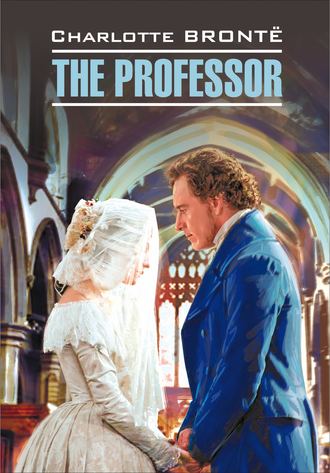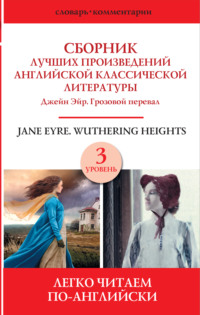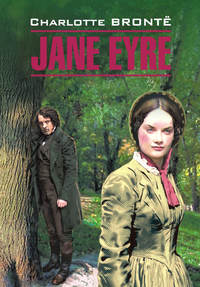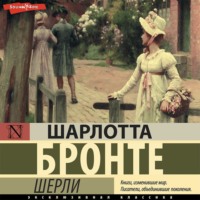
Полная версия
The Professor / Учитель. Книга для чтения на английском языке
“Oh, I shall not deny it! And if Hunsden hounded on the people to hiss you[73], he did quite right. You deserve popular execration; for a worse man, a harder master, a more brutal brother than you are has seldom existed.”
“Sirrah! sirrah!” reiterated Crimsworth; and to complete his apostrophe, he cracked the whip straight over my head.
A minute sufficed to wrest it from him[74], break it in two pieces, and throw it under the grate. He made a headlong rush at me, which I evaded, and said:
“Touch me, and I’ll have you up before the nearest magistrate.”
Men like Crimsworth, if firmly and calmly resisted, always abate something of their exorbitant insolence; he had no mind to be brought before a magistrate, and I suppose he saw I meant what I said. After an odd and long stare at me, at once bull-like and amazed, he seemed to bethink himself that, after all, his money gave him sufficient superiority over a beggar like me, and that he had in his hands a surer and more dignified mode of revenge than the somewhat hazardous one of personal chastisement.
“Take your hat,” said he. “Take what belongs to you, and go out at that door; get away to your parish, you pauper: beg, steal, starve, get transported, do what you like; but at your peril venture again into my sight! If ever I hear of your setting foot on an inch of ground belonging to me, I’ll hire a man to cane you.”
“It is not likely you’ll have the chance; once off your premises, what temptation can I have to return to them? I leave a prison, I leave a tyrant; I leave what is worse than the worst that can lie before me, so no fear of my coming back.”
“Go, or I’ll make you[75]!” exclaimed Crimsworth.
I walked deliberately to my desk, took out such of its contents as were my own property, put them in my pocket, locked the desk, and placed the key on the top.
“What are you abstracting from that desk?” demanded the mill-owner. “Leave all behind in its place, or I’ll send for a policeman to search you.”
“Look sharp about it, then,” said I, and I took down my hat, drew on my gloves, and walked leisurely out of the counting-house – walked out of it to enter it no more.
I recollect that when the mill-bell rang the dinner hour, before Mr. Crimsworth entered, and the scene above related took place, I had had rather a sharp appetite, and had been waiting somewhat impatiently to hear the signal of feeding time. I forgot it now, however; the images of potatoes and roast mutton were effaced from my mind by the stir and tumult which the transaction of the last half-hour had there excited. I only thought of walking, that the action of my muscles might harmonize with the action of my nerves; and walk I did, fast and far. How could I do otherwise? A load was lifted off my heart; I felt light and liberated. I had got away from Bigben Close without a breach of resolution; without injury to my self-respect. I had not forced circumstances; circumstances had freed me. Life was again open to me; no longer was its horizon limited by the high black wall surrounding Crimsworth’s mill. Two hours had elapsed before my sensations had so far subsided as to leave me calm enough to remark for what wider and clearer boundaries I had exchanged that sooty girdle. When I did look up, lo! straight before me lay Grovetown, a village of villas about five miles out of X – — . The short winter day, as I perceived from the far-declined sun, was already approaching its close; a chill frost-mist was rising from the river on which X – — stands, and along whose banks the road I had taken lay; it dimmed the earth, but did not obscure the clear icy blue of the January sky. There was a great stillness near and far; the time of the day favoured tranquillity, as the people were all employed within-doors, the hour of evening release from the factories not being yet arrived; a sound of full-flowing water alone pervaded the air, for the river was deep and abundant, swelled by the melting of a late snow. I stood awhile, leaning over a wall; and looking down at the current: I watched the rapid rush of its waves. I desired memory to take a clear and permanent impression of the scene, and treasure it for future years[76]. Grovetown church clock struck four; looking up, I beheld the last of that day’s sun, glinting red through the leafless boughs of some very old oak trees surrounding the church – its light coloured and characterized the picture as I wished. I paused yet a moment, till the sweet, slow sound of the bell had quite died out of the air; then ear, eye and feeling satisfied, I quitted the wall and once more turned my face towards X – — .
Chapter VI
I re-entered the town a hungry man; the dinner I had forgotten recurred seductively to my recollection; and it was with a quick step and sharp appetite I ascended the narrow street leading to my lodgings. It was dark when I opened the front door and walked into the house. I wondered how my fire would be; the night was cold, and I shuddered at the prospect of a grate full of sparkless cinders. To my joyful surprise, I found, on entering my sitting-room, a good fire and a clean hearth. I had hardly noticed this phenomenon, when I became aware of another subject for wonderment; the chair I usually occupied near the hearth was already filled; a person sat there with his arms folded on his chest, and his legs stretched out on the rug. Short-sighted as I am, doubtful as was the gleam of the firelight, a moment’s examination enabled me to recognize in this person my acquaintance, Mr. Hunsden. I could not of course be much pleased to see him, considering the manner in which I had parted from him the night before[77], and as I walked to the hearth, stirred the fire, and said coolly, “Good evening,” my demeanour evinced as little cordiality as I felt; yet I wondered in my own mind what had brought him there; and I wondered, also, what motives had induced him to interfere so actively between me and Edward; it was to him[78], it appeared, that I owed my welcome dismissal; still I could not bring myself to ask him questions, to show any eagerness of curiosity; if he chose to explain, he might, but the explanation should be a perfectly voluntary one on his part; I thought he was entering upon it.
“You owe me a debt of gratitude,” were his first words.
“Do I?” said I; “I hope it is not a large one, for I am much too poor to charge myself with heavy liabilities of any kind.”
“Then declare yourself bankrupt at once, for this liability is a ton weight at least. When I came in I found your fire out, and I had it lit again, and made that sulky drab of a servant stay and blow at it with the bellows till it had burnt up properly; now, say ‘thank you!’”
“Not till I have had something to eat; I can thank nobody while I am so famished.”
I rang the bell and ordered tea and some cold meat.
“Cold meat!” exclaimed Hunsden, as the servant closed the door, “what a glutton you are; man! Meat with tea! you’ll die of eating too much.”
“No, Mr. Hunsden, I shall not.” I felt a necessity for contradicting him; I was irritated with hunger, and irritated at seeing him there, and irritated at the continued roughness of his manner.
“It is over-eating that makes you so ill-tempered,” said he.
“How do you know?” I demanded. “It is like you to give a pragmatical opinion without being acquainted with any of the circumstances of the case; I have had no dinner.”
What I said was petulant and snappish enough, and Hunsden only replied by looking in my face and laughing.
“Poor thing![79]” he whined, after a pause. “It has had no dinner, has it? What! I suppose its master would not let it come home. Did Crimsworth order you to fast by way of punishment[80], William!”
“No, Mr. Hunsden.” Fortunately at this sulky juncture, tea was brought in, and I fell to upon some bread and butter and cold beef directly. Having cleared a plateful, I became so far humanized as to intimate to Mr. Hunsden that he need not sit there staring, but might come to the table and do as I did, if he liked.
“But I don’t like in the least,” said he, and therewith he summoned the servant by a fresh pull of the bell-rope, and intimated a desire to have a glass of toast-and-water. “And some more coal,” he added; “Mr. Crimsworth shall keep a good fire while I stay.”
His orders being executed, he wheeled his chair round to the table, so as to be opposite me.
“Well,” he proceeded. “You are out of work, I suppose.”
“Yes,” said I; and not disposed to show the satisfaction I felt on this point, I, yielding to the whim of the moment, took up the subject as though I considered myself aggrieved rather than benefited by what had been done. “Yes – thanks to you, I am. Crimsworth turned me off at a minute’s notice[81], owing to some interference of yours at a public meeting, I understand.”
“Ah! what! he mentioned that? He observed me signalling the lads, did he? What had he to say about his friend Hunsden – anything sweet?”
“He called you a treacherous villain.”
“Oh, he hardly knows me yet! I’m one of those shy people who don’t come out all at once, and he is only just beginning to make my acquaintance, but he’ll find I’ve some good qualities – excellent ones! The Hunsdens were always unrivalled at tracking a rascal; a downright, dis-honourable villain is their natural prey – they could not keep off him wherever they met him; you used the word pragmatical just now – that word is the property of our family; it has been applied to us from generation to generation; we have fine noses for abuses; we scent a scoundrel a mile off; we are reformers born, radical reformers; and it was impossible for me to live in the same town with Crimsworth, to come into weekly contact with him, to witness some of his conduct to you (for whom personally I care nothing; I only consider the brutal injustice with which he violated your natural claim to equality) – I say it was impossible for me to be thus situated and not feel the angel or the demon of my race at work within me. I followed my instinct, opposed a tyrant, and broke a chain.”
Now this speech interested me much, both because it brought out Hunsden’s character, and because it explained his motives; it interested me so much that I forgot to reply to it, and sat silent, pondering over a throng of ideas it had suggested.
“Are you grateful to me?” he asked, presently.
In fact I was grateful, or almost so, and I believe I half-liked him at the moment, notwithstanding his proviso[82] that what he had done was not out of regard for me. But human nature is perverse. Impossible to answer his blunt question in the affirmative, so I disclaimed all tendency to gratitude, and advised him if he expected any reward for his championship, to look for it in a better world, as he was not likely to meet with it here. In reply he termed me “a dry-hearted aristocratic scamp,” whereupon I again charged him with having taken the bread out of my mouth.
“Your bread was dirty, man!” cried Hunsden – “dirty and unwholesome! It came through the hands of a tyrant, for I tell you Crimsworth is a tyrant, – a tyrant to his workpeople, a tyrant to his clerks, and will some day be a tyrant to his wife.”
“Nonsense! bread is bread, and a salary is a salary. I’ve lost mine, and through your means[83].”
“There’s sense in what you say, after all,” rejoined Hunsden. “I must say I am rather agreeably surprised to hear you make so practical an observation as that last. I had imagined now, from my previous observation of your character, that the sentimental delight you would have taken in your newly regained liberty would, for a while at least, have effaced all ideas of forethought and prudence. I think better of you for looking steadily to the needful.”
“Looking steadily to the needful! How can I do otherwise? I must live, and to live I must have what you call ‘the needful,’ which I can only get by working. I repeat it, you have taken my work from me.”
“What do you mean to do?” pursued Hunsden coolly. “You have influential relations; I suppose they’ll soon provide you with another place.”
“Influential relations? Who? I should like to know their names.”
“The Seacombes.”
“Stuff! I have cut them.[84]”
Hunsden looked at me incredulously. “I have,” said I, “and that definitively.”
“You must mean they have cut you, William.”
“As you please. They offered me their patronage on condition of my entering the Church[85]; I declined both the terms and the recompence; I withdrew from my cold uncles, and preferred throwing myself into my elder brother’s arms, from whose affectionate embrace I am now torn by the cruel intermeddling of a stranger – of yourself, in short.”
I could not repress a half-smile as I said this; a similar demi-manifestation of feeling appeared at the same moment on Hunsden’s lips.
“Oh, I see!” said he, looking into my eyes, and it was evident he did see right down into my heart. Having sat a minute or two with his chin resting on his hand, diligently occupied in the continued perusal of my countenance, he went on:
“Seriously, have you then nothing to expect from the Seacombes?”
“Yes, rejection and repulsion. Why do you ask me twice? How can hands stained with the ink of a counting-house, soiled with the grease of a wool-warehouse, ever again be permitted to come into contact with aristocratic palms?”
“There would be a difficulty, no doubt; still you are such a complete Seacombe in appearance, feature, language, almost manner, I wonder they should disown you.”
“They have disowned me; so talk no more about it.”
“Do you regret it, William?”
“No.”
“Why not, lad?”
“Because they are not people with whom I could ever have had any sympathy.”
“I say you are one of them.”
“That merely proves that you know nothing at all about it; I am my mother’s son, but not my uncles’ nephew.”
“Still – one of your uncles is a lord, though rather an obscure and not a very wealthy one, and the other a right honourable: you should consider worldly interest[86].”
“Nonsense, Mr. Hunsden. You know or may know that even had I desired to be submissive to my uncles, I could not have stooped with a good enough grace ever to have won their favour. I should have sacrificed my own comfort and not have gained their patronage in return.”
“Very likely – so you calculated your wisest plan was to follow your own devices at once?”
“Exactly. I must follow my own devices[87] – I must, till the day of my death; because I can neither comprehend, adopt, nor work out those of other people.”
Hunsden yawned. “Well,” said he, “in all this, I see but one thing clearly – that is, that the whole affair is no business of mine.” He stretched himself and again yawned. “I wonder what time it is,” he went on: “I have an appointment for seven o’clock.”
“Three quarters past six by my watch.”
“Well, then I’ll go.” He got up. “You’ll not meddle with trade again?” said he, leaning his elbow on the mantelpiece.
“No; I think not.”
“You would be a fool if you did. Probably, after all, you’ll think better of your uncles’ proposal and go into the Church.”
“A singular regeneration must take place in my whole inner and outer man before I do that. A good clergyman is one of the best of men.”
“Indeed! Do you think so?” interrupted Hunsden, scofingly.
“I do, and no mistake. But I have not the peculiar points which go to make a good clergyman; and rather than adopt a profession for which I have no vocation, I would endure extremities of hardship from poverty.”
“You’re a mighty difficult customer to suit.[88] You won’t be a tradesman or a parson; you can’t be a lawyer, or a doctor, or a gentleman, because you’ve no money. I’d recommend you to travel.”
“What! without money?”
“You must travel in search of money, man. You can speak French – with a vile English accent, no doubt – still, you can speak it. Go on to the Continent, and see what will turn up for you there.”
“God knows I should like to go!” exclaimed I with involuntary ardour.
“Go: what the deuce hinders you? You may get to Brussels, for instance, for five or six pounds, if you know how to manage with economy.”
“Necessity would teach me if I didn’t.”
“Go, then, and let your wits make a way for you when you get there. I know Brussels almost as well as I know X – —, and I am sure it would suit such a one as you better than London.”
“But occupation, Mr. Hunsden! I must go where occupation is to be had; and how could I get recommendation, or introduction, or employment at Brussels?”
“There speaks the organ of caution. You hate to advance a step before you know every inch of the way. You haven’t a sheet of paper and a pen-and-ink?”
“I hope so,” and I produced writing materials with alacrity; for I guessed what he was going to do. He sat down, wrote a few lines, folded, sealed, and addressed a letter, and held it out to me.
“There, Prudence, there’s a pioneer to hew down the first rough difficulties of your path. I know well enough, lad, you are not one of those who will run their neck into a noose[89] without seeing how they are to get it out again, and you’re right there. A reckless man is my aversion, and nothing should ever persuade me to meddle with the concerns of such a one. Those who are reckless for themselves are generally ten times more so for their friends.”
“This is a letter of introduction, I suppose?” said I, taking the epistle.
“Yes. With that in your pocket you will run no risk of finding yourself in a state of absolute destitution, which, I know, you will regard as a degradation – so should I, for that matter. The person to whom you will present it generally has two or three respectable places depending upon his recommendation.”
“That will just suit me,” said I.
“Well, and where’s your gratitude?” demanded Mr. Hunsden; “don’t you know how to say ‘thank you?’”
“I’ve fifteen pounds and a watch, which my godmother, whom I never saw, gave me eighteen years ago,” was my rather irrelevant answer; and I further avowed myself a happy man, and professed that I did not envy any being in Christendom.
“But your gratitude?”
“I shall be off presently, Mr. Hunsden – to-morrow, if all be well: I’ll not stay a day longer in X – — than I’m obliged.”
“Very good – but it will be decent to make due acknowledgment for the assistance you have received; be quick! It is just going to strike seven: I’m waiting to be thanked.”
“Just stand out of the way, will you, Mr. Hunsden: I want a key there is on the corner of the mantelpiece. I’ll pack my portmanteau before I go to bed.”
The house clock struck seven.
“The lad is a heathen[90],” said Hunsden, and taking his hat from a sideboard, he left the room, laughing to himself. I had half an inclination to follow him: I really intended to leave X – — the next morning, and should certainly not have another opportunity of bidding him good-bye. The front door banged to.
“Let him go,” said I, “we shall meet again some day.”
Chapter VII
Reader, perhaps you were never in Belgium? Haply you don’t know the physiognomy of the country[91]? You have not its lineaments defined upon your memory, as I have them on mine?
Three – nay four – pictures line the four-walled cell where are stored for me the records of the past. First, Eton. All in that picture is in far perspective, receding, diminutive; but freshly coloured, green, dewy, with a spring sky, piled with glittering yet showery clouds; for my childhood was not all sunshine – it had its overcast, its cold, its stormy hours. Second, X – —, huge, dingy; the canvas cracked and smoked; a yellow sky, sooty clouds; no sun, no azure; the verdure of the suburbs blighted and sullied – a very dreary scene.
Third, Belgium; and I will pause before this landscape. As to the fourth, a curtain covers it, which I may hereafter withdraw, or may not, as suits my convenience and capacity. At any rate[92], for the present it must hang undisturbed. Belgium! name unromantic and unpoetic, yet name that whenever uttered has in my ear a sound, in my heart an echo, such as no other assemblage of syllables, however sweet or classic, can produce. Belgium! I repeat the word, now as I sit alone near midnight. It stirs my world of the past like a summons to resurrection; the graves unclose, the dead are raised; thoughts, feelings, memories that slept, are seen by me ascending from the clouds – haloed most of them – but while I gaze on their vapoury forms, and strive to ascertain definitely their outline, the sound which wakened them dies, and they sink, each and all, like a light wreath of mist, absorbed in the mould, recalled to urns, resealed in monuments. Farewell, luminous phantoms!
This is Belgium, reader. Look! don’t call the picture a flat or a dull one – it was neither flat nor dull to me when I first beheld it. When I left Ostend on a mild February morning, and found myself on the road to Brussels, nothing could look vapid to me. My sense of enjoyment possessed an edge whetted to the finest, untouched, keen, exquisite. I was young; I had good health; pleasure and I had never met; no indulgence of hers had enervated or sated one faculty of my nature. Liberty I clasped in my arms for the first time, and the influence of her smile and embrace revived my life like the sun and the west wind. Yes, at that epoch I felt like a morning traveller who doubts not that from the hill he is ascending he shall behold a glorious sunrise; what if the track be strait, steep, and stony? he sees it not; his eyes are fixed on that summit, flushed already, flushed and gilded, and having gained it he is certain of the scene beyond. He knows that the sun will face him, that his chariot is even now coming over the eastern horizon, and that the herald breeze he feels on his cheek is opening for the god’s career a clear, vast path of azure, amidst clouds soft as pearl and warm as flame. Difficulty and toil were to be my lot[93], but sustained by energy, drawn on by hopes as bright as vague, I deemed such a lot no hardship. I mounted now the hill in shade; there were pebbles, inequalities, briars in my path, but my eyes were fixed on the crimson peak above; my imagination was with the refulgent firmament beyond, and I thought nothing of the stones turning under my feet, or of the thorns scratching my face and hands.
I gazed often, and always with delight, from the window of the diligence (these, be it remembered, were not the days of trains and railroads). Well! and what did I see? I will tell you faithfully. Green, reedy swamps; fields fertile but flat, cultivated in patches that made them look like magnified kitchen-gardens; belts of cut trees, formal as pollard willows, skirting the horizon; narrow canals, gliding slow by the road-side; painted Flemish farmhouses; some very dirty hovels; a gray, dead sky; wet road, wet fields, wet house-tops: not a beautiful, scarcely a picturesque object met my eye along the whole route; yet to me, all was beautiful, all was more than picturesque. It continued fair so long as daylight lasted, though the moisture of many preceding damp days had sodden the whole country; as it grew dark, however, the rain recommenced, and it was through streaming and starless darkness my eye caught the first gleam of the lights of Brussels. I saw little of the city but its lights that night. Having alighted from the diligence, a fiacre conveyed me to the Hotel de – —, where I had been advised by a fellow-traveller to put up; having eaten a traveller’s supper, I retired to bed, and slept a traveller’s sleep[94].
Next morning I awoke from prolonged and sound repose with the impression that I was yet in X – —, and perceiving it to be broad daylight I started up, imagining that I had overslept myself and should be behind time at the counting-house. The momentary and painful sense of restraint vanished before the revived and reviving consciousness of freedom, as, throwing back the white curtains of my bed, I looked forth into a wide, lofty foreign chamber; how different from the small and dingy, though not uncomfortable, apartment I had occupied for a night or two at a respectable inn in London while waiting for the sailing of the packet! Yet far be it from me to profane the memory of that little dingy room! It, too, is dear to my soul; for there, as I lay in quiet and darkness, I first heard the great bell of St. Paul’s telling London it was midnight, and well do I recall the deep, deliberate tones, so full charged with colossal phlegm and force. From the small, narrow window of that room, I first saw the dome, looming through a London mist. I suppose the sensations, stirred by those first sounds, first sights, are felt but once; treasure them, Memory; seal them in urns, and keep them in safe niches! Well – I rose. Travellers talk of the apartments in foreign dwellings being bare and uncomfortable; I thought my chamber looked stately and cheerful. It had such large windows – croisées[95] that opened like doors, with such broad, clear panes of glass; such a great looking-glass stood on my dressing-table – such a fine mirror glittered over the mantelpiece – the painted floor looked so clean and glossy; when I had dressed and was descending the stairs, the broad marble steps almost awed me, and so did the lofty hall into which they conducted. On the first landing I met a Flemish housemaid: she had wooden shoes, a short red petticoat, a printed cotton bedgown, her face was broad, her physiognomy eminently stupid; when I spoke to her in French, she answered me in Flemish, with an air the reverse of civil[96]; yet I thought her charming; if she was not pretty or polite, she was, I conceived, very picturesque; she reminded me of the female figures in certain Dutch paintings I had seen in other years at Seacombe Hall.












